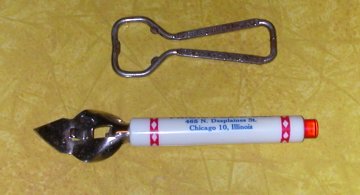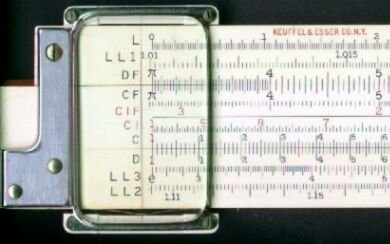Of Church Keys, Bottle Openers, and Change on an Everyday Level

Dean Esmay has an interesting post dealing, among other things, with church keys and pop tabs. Yes, I remember, back when I was a kid, pop cans and beer cans that required an opener. Later I remember detachable pop tabs on beer cans, well into my college years. I remember people making long chains of pop tabs; though, no, I was never inclined to drop the tab into the can. Especially not before I took a drink from it.
Somehow I've never gotten the hang of twist-off bottle caps. To this day, I always use a bottle opener on bottle caps. Though the bottle opener I use is rather ancient, translucent red tip, "Chicago 10, Illinois."
(The other opener in the picture reads, "People's Brewing Co., Oshkosh, Wis.")
Seems to me that changes like these make much more of an impact on people's lives on an everyday level, than the technological changes which are undeniably there, but often more evident to the geek or number cruncher than on any human level.
I grew up with TV. When I was a little kid, television as a medium was scarcely older than today's World Wide Web. And here's the thing: I grew up with a black & white TV in the house. When I was in college, I bought a small 12-inch black & white portable, which for many years was the only TV I had. I never owned a color TV in my life until 7 years ago— yes, not until October 1999. And I can tell you, whatever neat features my new color TV had— on-screen menu, remote control— none of it was as impressive, on a human scale, as the mere fact that the TV was color instead of B&W.
For that matter, my folks grew up in a world without TV. I suspect no changes in TV over the years are anywhere near as radical as the difference between a world with TV, and a world without TV. Yet 50 and 60 years on, we become inured to this difference, and mesmerized instead by those technical differences which can be quantified and measured— differences which pale, on any human scale, in comparison with the difference between color and black & white, or between TV and no TV.

My parents grew up with radio. But my grandparents grew up in a world without radio. I grew up in a world where radios were commonplace, and AM radio was still the "workhorse" of radio broadcasting. I remember back before AM had become primarily the domain of talk radio and sports radio. I remember big-city radio stations which provided just about every kind of radio programming you can imagine, from news to music to sports to radio programs.
In 1963 or 1964 I remember my aunt got a small table radio which had both AM and FM on it. This was the first time I had ever seen a radio which received FM. I was 7 or 8 years old. Yes, FM had been around for some time by then. But it had not yet gained preeminence. Much of the music was still on AM. I remember in the late 60s— and by this time I myself had a radio with FM on it— a lot of the rock music I listened to, I listened to on AM stations. WLS 890 out of Chicago was tremendously popular with some of my classmates, as a rock station.
Today I have radios with all sorts of high-tech features on them, digital tuning, keypad to punch in frequencies, memory chips which will store hundreds of radio frequencies. But on a human scale, the difference between then and now is much more aptly summed up in the changing ratio between AM and FM then, and AM and FM now.
I remember when I was about 10— we're talking 1966 here— we first got to use magic markers in art class. Magic markers in those days had an overpowering odor to them, and they dried out quickly if they weren't kept capped. You weren't supposed to smell of them, something about getting high and brain damage, that may have been an urban legend, I don't know. But they sure did smell. And they were also a big change compared to Crayola crayons.
Then, within a couple of years, when I was in junior high, the first felt-tipped pens came out. Sort of like a magic marker, but a lot thinner. I remember the problem with those early felt-tipped pens was that the point would go all mushy and out of shape after a while. It was several years before that problem was solved, and you had points that would hold their shape. Rollerball pens, of course, were still many years away.
Things like these make a tremendous difference in everyday life, from any human perspective. Yet I suspect the difference made by magic markers and felt tipped pens might slide clear by someone who only was looking at change from a purely quantitative, measurable, number-crunching-oriented angle.

Another huge change, which this time might register on the quantitatively-tunnel-visioned, since it has to do with numbers and mathematics: when I was in high school, in the early 70s, we still learned in math how to use a slide rule. I got three slide rules when I was in high school, still have two of them today. When I was about a junior in high school, I also got one of the earliest calculators which could be had for less than $100. Six digits, no decimal point, no memories. Of course, within just a couple of years, calculators had put the slide rule manufacturers out of business.
My brother relates that when he was in high school, mid to late 70s, they were still teaching how to use slide rules. Odd, as by that time slide rules were no longer being made.
Calculators have had a tremendous impact on how people do arithmetic, or rather on how people are no longer able to do arithmetic without punching away at those buttons. It's a tremendously different process from math with a slide rule, or math with pencil and paper. I still have a slide rule sitting on my desk, and I often use it in preference to a calculator. The slide rule, like the light saber, is "an elegant weapon from a more civilized time." Which makes me the last of the Jedi.
Phones. When I was very young, the phone in our house didn't even have a dial on it. You picked it up, and told the operator which number you wanted to call. Then, the rest of the years I was growing up, we had a rotary-dial phone. I forget when phones went to touch tone— doesn't seem I had one, at least, until the late 80s. None of which made as big a difference as the advent of cell phones. In this case, there is a positive correlation between technological change and change on a human scale.
But not always. Sometimes it's the lesser technological changes that make a bigger human difference. And even with phones, I wonder whether any change over the years really compares with the difference between phones and no phones. I've heard anecdotes about businessmen, as late as 1930, who categorically refused to take business calls— let some flunky deal with it instead!— because they'd never used telephones, when they first started out in business back in the days of gaslights and President Benjamin Harrison.
Sort of like the way some people feel today about computers.
Labels: auld_lang_syne








0 Comments:
Post a Comment
<< Home